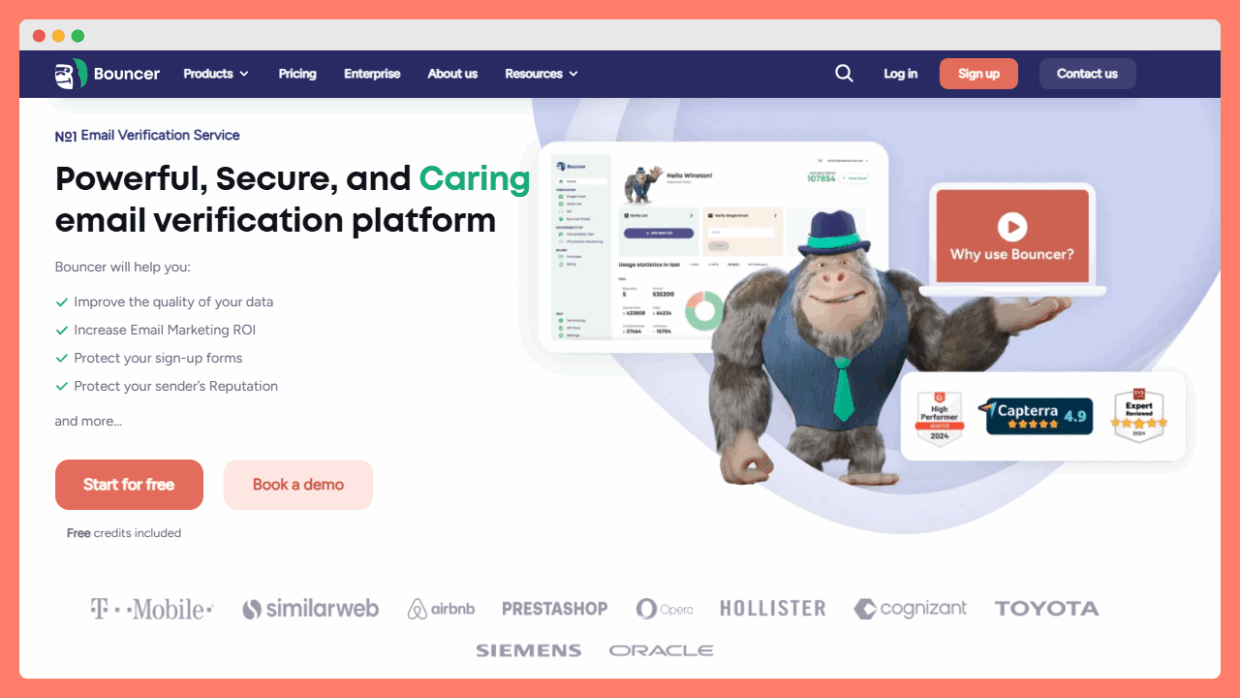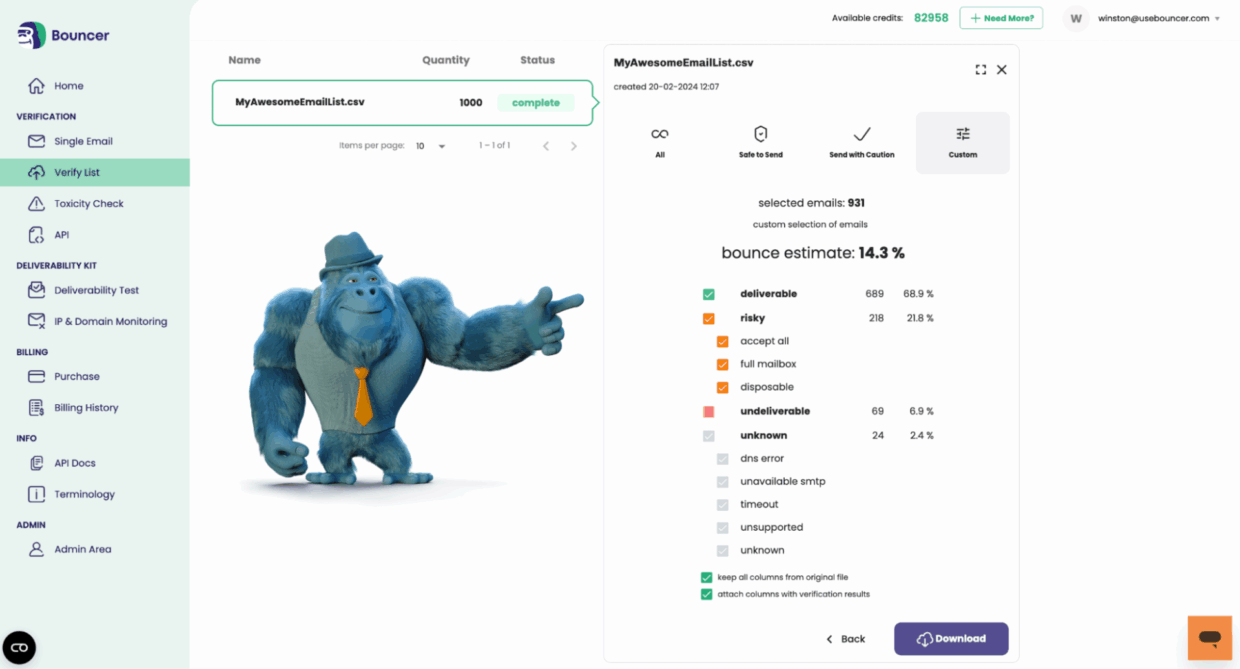Companies like Experian have built entire data quality ecosystems around cleaning and managing contact information. Their EDQ (Experian Data Quality) solution includes email validation as a core component.
But the big question is: does Experian’s tool fit every business? And are there leaner, more specialized alternatives if your real problem is simply cleaning your email list?
Let’s break it down.
What is Experian EDQ email validation?
At its core, Experian’s email validation tool is exactly what you’d expect: it helps businesses verify whether the email addresses in their databases are valid addresses. This process helps improve the overall data quality of customer systems, keeping your marketing, sales, and service efforts on track.
Since Experian operates globally across financial services, healthcare, retail, and government, their email validator sits inside a much larger data quality offering. Think of it as one component inside a massive data machine.
Experian’s address verification tools are built to help companies who are managing huge customer databases—often with millions of records—where errors, typos, and invalid data regularly pollute otherwise valuable information. The tool allows companies to run checks on individual email addresses or entire lists, and integrates with CRM systems and applications through APIs.
In the past 12 months alone, Experian processed more than 923 million email validation requests globally—so the scale is undeniable.
What Experian checks during email validation
The Experian email verification system takes your email list and processes it through several layers of checks:
- Syntax correction: Are your addresses formatted correctly? No missing “@” symbols or double dots? Experian helps correct basic typos before they cause bigger problems.
- Domain checks: Is the mail server for the domain active? Experian pings the SMTP server to confirm whether the server is capable of receiving messages.
- Mailbox checks: Is the recipient’s inbox still live? Experian can identify full or inactive inboxes and flag those addresses as risky.
- API and batch modes: Experian offers both real-time verification for new users (think: signup forms) and bulk verification for existing lists.
Essentially, the system tries to verify whether an email will bounce before you hit send—reducing wasted effort and improving overall email deliverability.
Where Experian shines
When you look at Experian’s strengths, it’s clear why major clients rely on them.
First, their global data quality expertise is trusted by industries where data compliance is non-negotiable. Financial firms, healthcare providers, and government agencies require absolute confidence that their customer data is clean, protected, and verified according to best practices.
Second, Experian offers real-time email validation through APIs that integrate into your existing tech stack. Whether you’re capturing leads, updating CRM records, or verifying addresses during customer onboarding, Experian makes it easy to validate data as you collect it—helping you fix errors at the source.
Third, for enterprise teams managing massive databases, Experian offers the ability to run huge batch validations while combining email verification with other data quality checks, including address verification and phone number validation.
In short, Experian helps businesses with massive data flows keep their entire system clean, not just email lists.
Where Experian may fall short for many businesses
While Experian is undeniably strong for large enterprises, it can be overkill for smaller teams and SaaS companies.
For starters, pricing and complexity are significant hurdles. Many of Experian’s offerings aren’t designed for self-serve small businesses but rather for large organizations with big budgets, long sales cycles, and heavy procurement processes. If you simply want to clean your email list before a campaign, the cost and onboarding process might feel disproportionate to the problem you’re trying to solve.
Additionally, Experian’s tools are often bundled into broader data quality packages that include address verification, credit data, demographic enrichment, and more. These extras may have no relevance to your immediate email validation needs but can still drive up complexity and costs.
For users who want transparency—such as scoring models, real-time risk flags, or detailed reports—Experian may not offer as much control at the individual address level as specialized verification providers.
Finally, agility is limited. SaaS companies, lead generation teams, and agencies running fast-paced email marketing campaigns often require rapid list uploads, instant results, and flexible API integrations that aren’t locked into enterprise sales models.
Where Bouncer becomes a better fit
Unlike Experian’s broad data quality platform, Bouncer is laser-focused on one thing: pure email validation.

Bouncer specializes in verifying email addresses quickly, affordably, and with extreme accuracy. Their system is purpose-built for businesses that care deeply about email deliverability and want cleaner email lists without getting stuck inside enterprise contracts.

What makes Bouncer stand out?
- Real-time email verification at point of entry: Bouncer catches invalid addresses the moment users enter them, helping you clean your CRM data upfront.
- Advanced spam trap detection: Unlike Experian’s basic checks, Bouncer goes deeper to catch hidden traps that can silently harm your sender reputation.
- Disposable and alias email detection: Catch fake addresses, throwaway users, and risky accounts that hurt campaign performance.
- Clear, transparent scoring: You get full visibility into risky addresses so your team can make better targeting decisions.
- Fully flexible API: Bouncer integrates easily into your signup forms, lead generation flows, and outbound sales tools without heavy development.
- Cost-effective for all team sizes: Whether you’re a startup, SaaS, digital agency, or enterprise, Bouncer’s pay-as-you-go structure makes sense no matter the size of your list.
- Ultra-fast batch cleaning: Upload large email lists and receive cleaned data within minutes, fully ready for your next email marketing campaign.
In short, Bouncer solves the specific problem most marketers actually face: you just need a fast, accurate way to verify your email addresses, reduce bounce backs, and maximize deliverability. You don’t need to buy a full data quality platform to achieve that.

Myth busting: clearing up common misconceptions about email validation
Myth 1: “If someone subscribes for a new account, the email must be valid.”
It’s a common assumption that when people subscribe for a new product, service, or newsletter, they always provide a correct email. In reality, people make typos, use fake addresses, or abandon forms. Without validation, you’ll quickly find bad data creeping into your field entries. That’s why real-time email verification is so important—to catch mistakes before they corrupt your data.
Myth 2: “I can verify my email lists once and I’m done.”
Some believe email validation is a one-time task. But contact lists constantly return outdated information as people change jobs, close accounts, or let inboxes go dormant. The state of your email list can degrade over time. Ongoing validation helps you learn when addresses are no longer deliverable, keeping your outreach effective and your sender reputation safe.
Myth 3: “Email validation only applies to marketing teams.”
The importance of accurate data extends far beyond just email marketing. Sales, support, finance, and many other areas of your business rely on accurate contact information. If your internal teams can’t touch the right people at the right time, you lose opportunities, revenue, and trust. Modern email validation tools are often enabled to integrate with multiple departments, ensuring every use case benefits from clean data.
Choosing based on your real need
Here’s the simplest way to think about it:
- If your business is managing tens of millions of customer records across multiple data systems—and you also need address verification, credit checks, and compliance audits—then Experian’s larger platform may fit.
- If your need is to quickly and affordably clean email lists for sales, marketing, or onboarding without enterprise overhead, Bouncer is often the smarter, faster solution.
Both tools verify email addresses, but they serve very different kinds of clients.
Final thoughts
Experian EDQ email validation is a robust solution for clients who need comprehensive data quality across multiple systems. But if your primary need is simply to keep your email lists clean, your sender reputation protected, and your campaigns efficient, specialized tools like Bouncer often deliver more value with far less friction.
In the end, it’s not about features—it’s about solving your actual problem. If that problem is bad email addresses hurting your results, Bouncer keeps it simple—and simply works.
FAQs
What is email validation and why is it important for businesses?
Email validation checks whether an email address is valid, active, and reachable. This process helps businesses avoid errors, reduce bounce backs, and protect their sender reputation while ensuring messages reach the intended recipients.
How does Experian verify email addresses in real time?
Experian’s real-time validation API connects directly into your CRM or signup forms, verifying each email address as it’s entered. This prevents errors at the data capture stage and helps maintain data quality from day one.
Can email validation improve marketing ROI?
Absolutely. Clean email lists lead to better click-through rates, fewer bounce backs, and higher engagement. Validating addresses ensures that your email marketing dollars go to real contacts, improving the overall value of your campaigns.
Are Experian’s email validation tools good for smaller businesses?
While technically available, Experian’s software may feel too heavy or complex for smaller teams. Tools like Bouncer offer simpler, more cost-effective solutions focused strictly on email validation without the extra enterprise components.
What’s the difference between address verification and email validation?
Address verification refers to physical mailing addresses (like street and postal addresses) being accurate for shipping or billing. Email validation focuses on ensuring email addresses are real, reachable, and don’t cause delivery issues.

